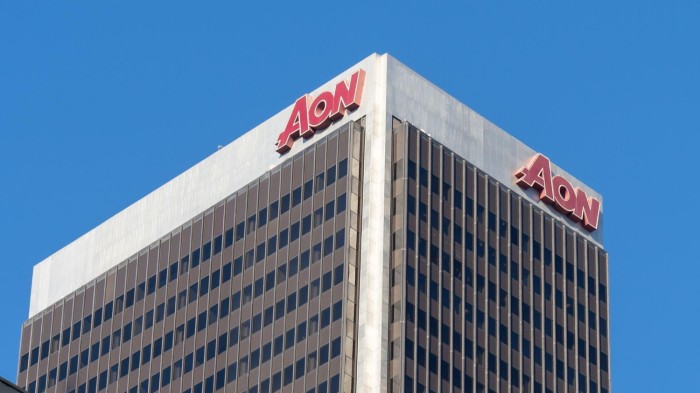
Aon sued for alleged fraud linked to credit insurance for start-ups
Unlock the Editor’s Digest for free
Roula Khalaf, Editor of the FT, selects her favourite stories in this weekly newsletter.
Aon, the world’s second-biggest insurance broker, is being sued for alleged fraud over its role in marketing a new form of insurance that helped start-ups raise money.
A trust representing creditors to the bankrupt technology company Vesttoo filed a case in Delaware bankruptcy court on Wednesday that sheds light on the broker’s push, dating back to 2020, into the growing market for credit insurance.
Vesttoo, an Israeli artificial intelligence business once backed by Goldman Sachs and valued at $1bn in 2022, operated a marketplace where insurers could sell insurance-linked securities to investors. The company filed for bankruptcy in 2023 after it emerged that insurance policies sold using the platform had been backed by allegedly fraudulent letters of credit.
A subsequent investigation ordered by Vesttoo’s board alleged two members of the company’s senior leadership were directly involved in creating fraudulent documents.
A spokesperson for Aon said: “This lawsuit represents a perverse attempt by Vesttoo’s bankruptcy estate to shift responsibility for Vesttoo’s deliberate fraud to Aon, one of the fraud’s biggest victims. Vesttoo has already acknowledged in its own investigative report that executives of the company, along with other co-conspirators, were responsible for the fraud and intentionally sought to mislead Aon and other impacted parties. We will vigorously defend Aon against these meritless claims.”
The case was viewed by the insurance industry as a scandal largely driven by bad actors with links to Vesttoo.
However, the trust set up to recover value for creditors to Vesttoo, which include arms of insurance companies Beazley and Markel, alleged in the latest court filing that Aon also committed fraud as it sought to promote a new “IP-backed lending” product.
The product was developed amid a broader boom in credit insurance. Credit insurance has historically referred to trade-linked products — such as insuring the delivery of a shipment of bananas — but has grown to encompass a variety of financial guarantees for banks and other lenders exposed to default risk.
Aon started marketing its IP product in 2020, saying it would help “high-growth firms” with “leveraging” their intellectual property as collateral for debt financing.
A team at Aon estimated how much a company’s intellectual property would be worth in a default, enabling the company to take out loans based on the value of its IP alongside its tangible assets. The company would then pay an insurance premium based on that valuation.
The risks associated with the policies were packaged as securities, and Vesttoo was used to help find capital markets investors in the products.
The lawsuit alleges that Aon’s valuations of IP were “abysmal” and “resulted in vastly inflated IP valuations, with the liquidation value of the IP proving to cover just a small fraction (if any) of the debt it was meant to secure”.
Aon estimated that just 3-6 per cent of companies would default, according to the lawsuit. Instead, the lawsuit says, borrowers “overwhelmingly” defaulted, prompting lenders to turn to IP collateral to try to cover their losses.
According to internal emails in the legal filing, Aon had raised concerns with the product, acknowledging that “pre-revenue borrowers are not well suited to CPI [collateral protection insurance] loans” because it was “incredibly difficult to project the value of the IP” for companies before they generated revenue.
The lawsuit points to a high-end men’s razor start-up, Shavelogic, whose IP consisted “primarily” of “patents related to the manner in which Shavelogic’s razor cartridge attached to the handle and associated trademarks”.
Aon valued ShaveLogic’s IP at $468mn, according to the lawsuit. ShaveLogic later defaulted on its loan obligations under the transaction arranged by Aon, the lawsuit claims, and was later sold for just $70mn.
“Aon not only created the CPI product, it also created a market for the product by finding lenders and convincing them to extend loans to risky start-ups,” the lawsuit alleges.
As late as July 2023, Aon chief executive Greg Case said on an investor call that Aon had built a marketplace for IP lending with “almost 30 insurers” and hit $2bn in aggregate insured transaction value. Since then, the broker has removed materials associated with the business segment from its website.






No Comment! Be the first one.